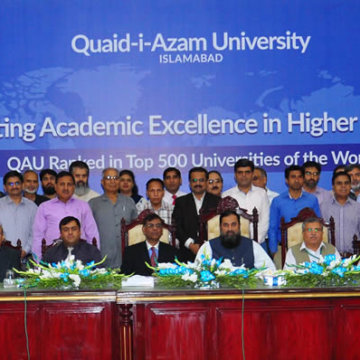- About
- Topics
- Picks
- Audio
- Story
- In-Depth
- Opinion
- News
- Donate
-
Signup for our newsletterOur Editors' Best Picks.Send
Read, Debate: Engage.
| located: | Pakistan |
|---|---|
| editor: | Shadi Khan Saif |
Armed police force entered the campus of one of Pakistan’s leading universities earlier this week to forcefully disperse a peaceful demonstration by the university students.
Subsequent events at the Quad-i-Azam University in the capital Islamabad led to tragic, chaotic and unfortunate – whatever you call it – circumstances, with blood-stained students beaten-up by the police and rounded up into police vehicles. These heart breaking images went viral on social media, amplifying the impacts of state oppression against the very basic right of assimilation and protesting to defy oppressive policies.
A total of 70 students of the QAU were taken into custody by the federal capital’s police for demanding the release of expelled students, protesting against an increase in the fee, and a number of other anti-student measures adopted by the university administration. Justifying the high-handedness of the police, the Vice Chancellor of the QUA, Dr. Javed Ashraf, pronounced these students as “some unruly individuals.”
In this particular case, the QAU administration might argue the extreme intervention was made for the welfare of the students – who have nothing to do with all this ‘politics’; as if a political engagement for rights is a crime, and wish to go on with their studies. But, what about the students coming from poor provinces such as Baluchistan and remote areas of other provinces? Those who cannot afford an increase in fee, but are equally dreaming of a promising future, like the one available to their university peers from the well-off capital of Islamabad. Finally, since when and with what reasons has peaceful agitation become a crime, with demonstrations on a university campus, at that.
It comes then as no surprise that there isn’t a prominent presence of locally educated bright minds on the political arena in Pakistan, a country dominated by feudalism and nepotism. Universities are repeatedly failing to nurture young minds beyond the production of machine-like thinkers. Students are simply groomed to perform certain tasks in line with guidelines and instructions.
In April this year, a young university student, Mashal Khan, was lynched to death on the Abdul Wali Khan University campus by some fellow students who charged him of alleged blasphemy. Later in May, Saad Aziz – a young educated boy from a leading private educational institute in Karachi, confessed to killing members of Shia community and a leading female civil society activist Sabeen Mehmood in the port city.
In September, police in southern Sindh province accused a Karachi University student for being an active commander of a militant group and involved in attempted murder of a provincial assembly member.
A clear-eyed view of the situation demands that the students should be allowed to exercise their democratic rights, engage in healthy debates that fuel individualistic thinking, instead of being oppressed and left for exploitation.
Photo: Quaid-i-Azam University (QAU)
